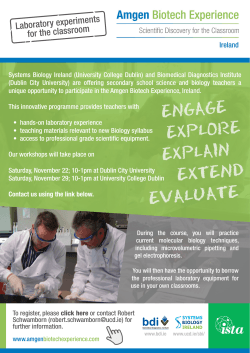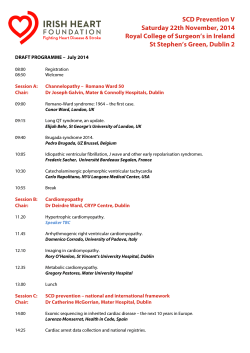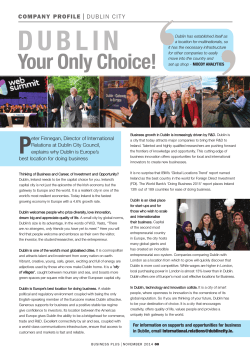
Title Name Research Institution Email
Title Prof. Dr. Dr. Prof. Name Lorraine O’Driscoll Juliette Hussey Graham Pidgeon Noel Lowndes Research Institution Director of Research, School of Pharmacy & Pharmaceutical Sciences, Panoz Institute & Trinity Biomedical Sciences Institute (http://www.tcd.ie/biosciences/), Trinity College Dublin, Dublin 2, Ireland Trinity College Dublin, University of Dublin Trinity College Dublin, School of Medicine Centre for Chromosome Biology, NUI Galway Email odrisc@tcd.ie Research Interests Link To Biography • Understanding exosomes and other vesicles that carry information in the bloodstream and contribute to cancer spread/”metastasis” and drug resistance; exploring proteins in cells that have potential as new anticancer targets for drugs; improved ways of testing drugs in the laboratory to increase their success in patients; http://www.pharmacy.tcd.ie/research/ • Finding ways of matching the right anti-cancer drugs to the right patients for most benefit and least side-effects; • Pancreatic, colon, lung, ovarian cancers • [These studies would include laboratory, translational and clinical research] http://www.mehad-cost.eu/index.php/contact-details (EU Consortium led by LOD) jmhussey@tcd.ie The aim of my research programme is improving exercise prescription to optimise therapeutic responses to interventions in patients with cancer. While there is strong evidence at an epidemiological level for the benefit of exercise in the prevention and treatment of disease, much remains to be discovered regarding dose response. The current activities include: fitness http://people.tcd.ie/jmhussey and activity in breast cancer survivors and the relationship with insulin resistance, lipids and inflammatory markers, modifiable risk factors in unaffected BRCA 1 and BRCA 2 gene carriers, exercise interventions and physical performance measures in patients after chemotherapy, and preoperatively for those with oesophageal cancer. pidgeong@tcd.ie Dr. Pidgeon's group have a particular interest in the molecular pathways activated in cancer cells following culture with human adipose tissue, including the activation of immune cell subsets in visceral adipose tissue, alterations in tumour metabolism and how obesity drives the EMT process in solid malignancies. Other areas of interest include the role of bioactive https://medicine.tcd.ie/surgery/research/research-staff-profiles.php lipid enzymes, including cyclooxygenases and lipoxygenases, in tumour metabolism, angiogenesis and metastasis of oesophageal, colorectal , lung and breast cancer. Through national and international collaborations, the group are investigating the potential of novel pharmacological and naturally occurring small molecules (some of which target LOX) as antiangiogenic and anti-cancer agents. noel.lowndes@nuigalway.ie Professor Lowndes began his career as a cancer biologist at the Beatson Institute for Cancer Research, Glasgow studying the H-ras oncogene. Moving to London his interest in cellular proliferation were expanded first at the National Institute for Medical Research (NIMR) and subsequently at Cancer Research UK’s Clare Hall laboratories. In 2001 he returned to Ireland to take up the Chair of Biochemistry at NUI Galway where he works http://www.nuigalway.ie/our-research/people/natural-sciences/noellowndes/ to elucidate the mechanisms of action of tumour suppressor genes required for maintenance of genome stability. Among his current research interest are DNA double strand break repair, transcription associated genome instability and the role of RNA in the DNA damage response (see http://www.ncbi.nlm.nih.gov/pubmed/?term=lowndes+n for recent publications). My key interest is in optimal decison-making in paediatric oncology. This includes children's and parents’ participation in diagnosis, clinical trials, treatment, palliative care, end-of-life decisions. I am interested in developing on-line interventions to promote optimal decision-making and the impact on quality of care and health outcomes. Other broader research interests include: psychosocial care of children http://people.tcd.ie/Profile?Username=coynei with cancer, experiences of survivors; needs and expectations of long-term follow up care; children & young people’s transition to adult services, parents’ role in delivery of technological care at home. I have expertise in both qualitative and quantitative research methods and systematic reviews. Prof. Imelda Coyne Trinity College Dublin coynei@tcd.ie Prof. Therese Kinsella University College Dublin Therese.Kinsella@ucd.ie There is overwhelming evidence that Aspirin reduces the risk of many cancers. While Aspirin acts by inhibiting thromboxane biosynthesis, how it reduces cancer risk is unknown. Through ground breaking ICS-funded http://www.ucd.ie/sbbs/sbbsstaff/academicstaff/tkinsella/ research, we recently established that the thromboxane receptor is upregulated in prostate cancer and identified a mechanism whereby thromboxane promotes prostate cancer progression and metastasis. Dr. Eva Szegezdi NUI, Galway Eva.szegezdi@nuigalway.ie Dr. Szegezdi is a lecturer in Biochemistry and the director of the MSc programme in Cancer Research at NUI, Galway. Her area of research is signal transduction pathways in cancer cells and how these pathways can be exploited to design novel therapies. Current projects focus on (1) identifying novel drugs for acute leukemia targeting the microenvironmenthttp://www.apoptosis.ie/eva.html of the tumour cells and synthetic lethality. (2) Maximise the tumoricidal effect of the cell death-inducing cytokine, TRAIL using computational protein engineering and developing protein-protein interaction inhibitor. (3) Predict tumour drug response using omits and machine learning/ bioinformatical methods to identify co-acting gene clusters. Prof. Stephen Pennington School of Medicine and Medical Science, UCD Conway Institute (in collaboration with Dana Farber Cancer Centre). stephen.pennington@ucd.ie Investigating cross-talk and signalling in the prostate tumour microenvironment to reveal mechanisms of epithelial: stroma interactions http://www.ucd.ie/research/people/medicinemedicalscience/professorstephenr that contribute to tumour progression: combined RNAseq and oypennington/ proteomic analysis. martinsj@tcd.ie My laboratory is interested in all aspects of Cell Death control, especially Apoptosis and Programmed necrosis. The ultimate goal of all cancer therapies is to kill unwanted cancerous We use multidisciplinary approaches to explore how transformed cells resist anti-cancer drug treatments and are one of the most highly cited laboratories, worldwide, in the area of cell death control. See some of our recent papers for more information: tissue while sparing healthy untransformed cells. Carroll, R., Hollville, E. and S.J. Martin (2014) Cell Reports, in press., Hollville, E., https://www.tcd.ie/Genetics/research/martin.php Carroll, R. and S.J. Martin (2014) Molecular Cell 55, 451-466 Cullen, S.P., Henry, C.M., Kearney, C.J., Logue, S.E., Feoktistova, M., Tynan, G.A., Lavelle, E.C., Leverkus, M. and S. J. Martin (2013) Molecular Cell 49, 103448., Martin, S.J., Henry, C.M., and Cullen, S.P. (2012). Molecular Cell 46, 387-397. Elgendy, M., Sheridan, C., Brumatti, G. & S.J. Martin (2011) Molecular Cell 42:23-35. Afonina, I.A., Tynan, G.A., Logue, S.E., Cullen, S.P., Bots, M., Lüthi, A.U., Reeves, E.P., McElvaney, N.G., Medema, J.P., Lavelle, E.C. & S.J. Martin (2011) Molecular Cell 44, 265-278. Prof. Dr. Seamus J. Martin Research Institution: Dept. of Genetics, Trinity College Dublin Amanda McCann UCD Conway Institute Of Biomolecular And Biomedical Research And UCD School Of Medicine And Medical Science (UCD SMMS), University College Dublin amanda.mccann@ucd.ie • Chemoresistance mechanisms in Ovarian cancer and Triple Negative Breast Cancer (TNBC) • Therapeutic induced cellular senescence (TIS) and the implcations of this viable cellular fate on chemoresistance. http://www.ucd.ie/research/people/medicinemedicalscience/dramandamccann • Hypoxia induced exosome profiling, exosome recipient cell uptake and / exosomal functional impact on propagating chemoresistance. Epigenetic signatures of chemoresistance Dr. Peter O'Gorman Mater Institute for Research and Therapy pogorman@mater.ie In 2008 Dr O’Gorman in collaboration with Prof Ken Anderson and Prof Paul Richardson of the Dana Farber Cancer Institute in Boston established the MIRT Ireland-DFCI post-graduate MD-PhD program. The goal of the program is in the short term to expose trainees to working in a worldleading Multiple Myeloma centre, complete a research thesis and produce www.mirtireland.com peer-reviewed publications. In the long term the program will train a new generation of Scientists who will raise clinical and research standards in Irish Haematology and continue to develop collaborations with leading world centres in clinical and scientific research into the future. http://www.dcu.ie/info/staff_member.php?id_no=1465 http://www.ucd.ie/sbbs/sbbsstaff/academicstaff/bkennedy/ Dr. Robert O'Connor National Institute for Cellular Biotechnology, Dublin City University robert.oconnor@dcu.ie My research focusses on Cancer Pharmacology. Specific areas include; methods of individualising cancer treatment, advancing treatment of malignancies especially breast and pancreatic cancer, analytical cancer pharmacology (measurement of cancer drug levels in cell, tissues and blood), cancer drug resistance, development of xenograft tumour models, translating cancer research into patient treatment advances and development of markers for rapid identification of tumour response to treatment. http://www.nicb.dcu.ie/staff_robert_o_connor.html Dr. Breandán N. Kennedy University College Dublin brendan.kennedy@ucd.ie Our group is interested in the discovery and development of novel small molecule drugs that improve the treatment of cancer. Using the zebrafish model, we perform unbiased phenotype-based drug screens to identify novel inhibitors of angiogenesis. Validated hit drugs and analogs are progressed through anti-angiogenic efficacy, safety and mechanism of action studies in mammalian models. Dr. Dr. Dr. Dr. Ken Nally Paula Meleady Radka Fahey (Saldova), Martin Barr School of Biochemistry and Cell Biology, University College Cork Dublin City University, National Institute for Cellular Biotechnology NIBRT (National Institute for Bioprocessing Research and Training) St James’s Hospital & Trinity College Dublin k.nally@ucc.ie paula.meleady@dcu.ie radka.fahey@nibrt.ie Host-Microbe Interaction, Inflammation, and Cancer Biology (1) HostMicrobe interactions in health, inflammatory disease and colon cancer (2) Immunopathology in inflammatory disease and colon cancer (3) Mechanisms underpinning cross-talk and synergism between inflammatory signalling pathways (4) Specific focus on Interferon (IFN) and Tumor Necrosis Factor (TNF) signalling pathways (5) Crosstalk between inflammatory and oncogenic receptor tyrosine http://publish.ucc.ie/profiles/C012/knally kinase (RTK) signalling pathways (6) Epigenetic mechanisms underpinning regulation of inflammatory, antiviral and oncogenic (RTK) gene expression (7) Functional genomics analysis of inflammatory, cell survival and cell death pathways (8) Discovery of cancer cell intrinsic tumour suppressor mechanisms underpinning immune-mediated suppression of cancer Clinical Membrane Proteomics: proteomic analysis of membrane proteins in uveal (ocular) melanoma and multiple myeloma disease progression in order to identify cell surface targets that may be amenable to therapeutic intervention, e.g. with monoclonal antibody and/or antibody drug conjugate (ADC) therapies. Strong clinical collaborations have been set up with clinicians at the Royal Victoria Eye and Ear Hospital, Dublin to understand uveal melanoma metastatic disease, and with haematologists at the Mater Hospital, Dublin to study multiple myeloma disease progression. http://www.dcu.ie/info/staff_member.php?id_no=1300 Epigenetic regulation of glycosylation and the impact on chemoresistance in cancer Disease biomarker discovery in various cancers including - ovarian, breast, lung, prostate, uveal, skin, colorectal and pancreatic and other diseases (AAT deficiency, CDG, Rhematoid Arthritis) http://www.nibrt.ie/cat_principal_investigators.jsp?i=241 Development and utilisation of high-throughput technologies for N-glycan analysis Glycan analysis (glycans from serum, cells and isolated glycoproteins) mbarr@stjames.ie With a keen interest in Translational Biology, Dr Barr has a number of key research interests in non-small cell lung cancer (NSCLC). These include projects investigating the role of VEGF and its receptors in lung cancer cell signalling, miRNA profiling and gene signatures as potential markers in the treatment of lung cancer patients and the effects of the hypoxic http://www.medicine.tcd.ie/research/researchers/martin-barr.php microenvironment on cell survival signalling pathways. In addition, Dr Barr has played a major role in establishing a Lung Cancer Biobank and in initiating a research programme relating to chemoresistance and cancer stem cells (Barr et al., PLoS One, 2013). barrma@tcd.ie Prof. Ciaran Morrison National University of Ireland Galway Ciaran.morrison@nuigalway.ie Our projects use genome engineering, cell biology, advanced microscopy and biochemistry to dissect how DNA damage affects centrosomes, organelles that organise the cytoskeleton and the mitotic spindle apparatus. Centrosome abnormalities are implicated in cell cycle dysregulation, mitotic aberrations, problems in chromosome segregration, http://www.nuigalway.ie/biochemistry/staff/morrison/index.html aneuploidy and genomic instability, all of which contribute to tumorigenesis. Furthermore, changes in centrosome number alter the invasive capacity of cancer cells. Students interested in molecular mechanisms of cellular transformation are encouraged to apply. http://www.chromosome.ie/researchers/morrison/ Prof. Pamela Gallagher Dublin City University pamela.gallagher@dcu.ie Survivorship: Psychosocial adjustment to and impact of cancer; Living with http://www.dcu.ie/info/staff_member.php?id_no=697 the effects of cancer (e.g. prostheses, lymphoedema); Self-management Patrick.Kiely@ul.ie The research emphasis in our laboratory is on deciphering the localized and transient signalling events which occur in cells during migration. We have a specific interest in defining the signaling pathways regulating cell migration in breast cancer and colon cancer. We are using a series of complimentary and synergistic cellular and molecular approaches and http://cancerresearchul.com/ novel technologies to investigate how protein complexes are assembled in signalling pathways during this process. Understanding the molecular mechanisms that regulate cell migration is of important intellectual and clinical interest, and we believe this work may reveal fresh approaches to target cancer. Dr. Patrick A. Kiely University of Limerick Dr. Margaret Mc Gee UCD School of Biomolecular and Biomedical Science, Conway Institute, University College Dublin margaret.mcgee@ucd.ie Mitotic Catastrophe (MC) is an innate oncosuppressive mechanism for the prevention of genome instability and thus tumourigenesis. MC senses mitotic defects and communicates with the mitotic checkpoint machinery, and the cell death and senescence machinery to prevent the continued proliferation of genomically unstable cells. Current anti-cancer therapies such as radiation therapy and chemotherapy act by inducing MC in tumour cells. Thus, failed MC represents a major gateway to both tumour onset and the development of drug resistant subtypes. Despite its critical importance in tumour prevention, the molecular mechanism of MC http://www.ucd.ie/conway/research/researchers/conwayfellowsaremains poorly understood and there are currently no mechanistic z/drmargaretmcgee/ biomarkers to aid drug development programmes and/or predict patient response to current drugs. Our laboratory is focused on understanding the molecular mechanism underlying MC in a range of tumours including glioblastoma and neuroblastoma, with a particular focus in dissecting the molecular signals that connect the mitotic and cell death machinery, with the view to revealing new strategies to exploit the process for therapeutic benefit as well as identify novel mechanistic biomarkers that will inform clinical administration of currently available therapies. Prof. Brendan Murphy School of Mathematical Sciences, University College Dublin brendan.murphy@ucd.ie Classification, clustering, medical decision making, prostate cancer, multivariate analysis, biomarker discovery. http://www.ucd.ie/mathsciences/ourpeople/academicstaff/profbrendanmurphy / pancreatic cancer; lung cancer;uveal and cutaneous melanoma;multiple myeloma. Prof. Martin Clynes NICB, Dublin City University martin.clynes@dcu.ie biomarker and ADC target discovery - proteins and miRNAs in vitro models for chemo- and radio-resistance http://www.nicb.dcu.ie/ Dr. Dr. Kathy Gately Laure Marignol Trinity College Dublin Trinity College Dublin kgately@stjames.ie Marignol@tcd.ie The focus of my translational research is the identification of new prognostic/predictive biomarkers and therapeutic targets to improve patient treatment options. Ongoing projects include elucidating mechanisms of resistance to (i) chemotherapy and (ii) targeted therapies. We have recently identified a novel targetable kinase which plays a key role in the emergence of resistance to both PI3K and EGFR targeted therapies in NSCLC and are currently investigating dual inhibition strategies. Clinical studies comparing cfDNA, CTCs and biopsy tissue for detection of multiple gene mutations by next-generation sequencing (IonTorrent) technology highlight the importance of the liquid biopsy in cancer diagnosis and treatment. https://www.tcd.ie/IMM/thoracic-oncology/profiles/kathy-gately.php Following a prostate cancer diagnosis, approximately 50 percent of men will receive radiation therapy. Despite sophisticated treatment approaches, some patients will not be cured. Our ability to determine which patients are at greater risk of recurrence is currently inadequate, and at the same time novel treatment approaches are needed to prevent the tumour from evolving further in these men. My research aims to address both of these http://www.medicine.tcd.ie/research/researchers/laure-marignol.php challenges. My main project, funded by the Irish Cancer Society, investigates novel genetic markers, called miRNAs, whose presence may be associated with a greater risk of prostate cancer recurring after radiotherapy. Inflammation and Breast and Prostate Cancer Chronic inflammation and infection are major mediators of cancer initiation and cancer progression. Key mediators of inflammation-induced cancer include NFkB, reactive oxygen and nitrogen species, inflammatory cytokines, prostaglandins and specific microRNAs, which in turn exert their effects though changes in cell proliferation, apoptosis, cellular senescence, DNA mutation rates, DNA methylation, cell invasiveness and angiogenesis. Together these species present the ideal targets for early detection, diagnosis, prediction of outcome and also therapeutic targets. The Prostate Cancer - Bone Marrow Mesenchymal Stem Cells Parahttp://www.nuigalway.ie/our-research/people/medicine/sharonglynn/ endocrine Axis in the metastatic tumor microenvironment Mesenchymal stem cells (MSC) are multipotent stem cells that can differentiate into osteoblasts, chondrocytes, adipocytes, myocytes and neurons. In recent studies it has been shown that MSC can also home to tumour sites and contribute to tumour growth and progression. MSC have been shown to increase the metastatic potential of tumour cells by promoting their migration and invasion as well as having a role in the development of a metastatic niche at the secondary site. Dr. Sharon Glynn National University of Ireland Galway sharon.glynn@nuigalway.ie Dr. Naomi Walsh Dublin City University naomi.walshflanagan@gmail.com Dr. Norma O’Donovan Dublin City University Norma.odonovan@dcu.ie Molecularly targeted therapies for cancer; Kinases and signalling pathways in cancer; HER2 positive breast cancer; Triple negative breast cancer; http://www.nicb.dcu.ie/staff_norma_o_donavan.html Malignant melanoma byrnea13@tcd.ie Protein trafficking and secretion and fundamental processes critical for cell function. These processes are impaired or altered in cancer, allowing the cancer cells to switch on pro-tumouigenic properties such as cell survival, invasion and metastasis. My research is focused on understanding how proteins are processed trafficked and secreted in cancer. This research has lead to the identification of novel mechanisms of cancer progression and http://ie.linkedin.com/pub/anne-marie-byrne/22/663/a12 biomarkers capable of identifying patients with cancer. Being part of a multi-disciplinary team, including research scientists and clinicians, allows for translation of our research from bench to bedside. http://www.cancer.ie/research/our-research/funded-researchers/annemarie-byrne Dr. Anne-Marie Byrne Trinity College Dublin Cancer Biomarkers -development of prognostic/predictive classifiers to stratify for individualized therapies. Response and resistance of chemotherapy and molecular targeted therapies Cancer chemoprevention clinical trials www.linkedin.com/pub/naomi-walsh/42/531/883/
© Copyright 2025











